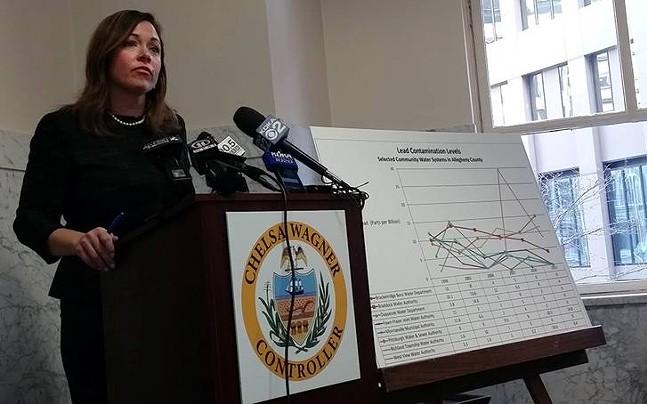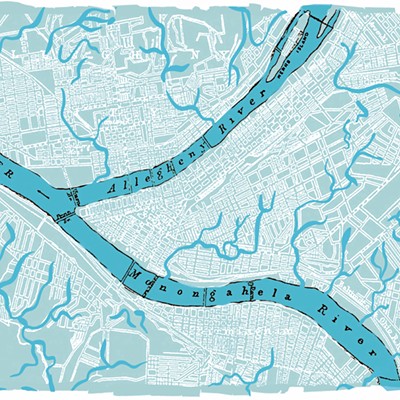Monday, December 19, 2016
Allegheny County Controller calls on health department to address Pittsburgh lead concerns
Several entities have been blamed for issues at the Pittsburgh Water and Sewer Authority over the past few years. First customers had issues with inaccurate and untimely bills. Then the public was outraged by an across-the-board rate hike. And most recently, Pittsburghers have been reeling at news that the PWSA's water surpassed the federal lead limit.
Pittsburgh city government has blamed Veolia, the private company hired to manage PWSA, and Veolia has in turn blamed city government for the issues. And now Allegheny County Controller Chelsa Wagner is bringing another party into the fold: the Allegheny County Health Department.
At a press conference today, the controller's office said the ACHD, had a responsibility to monitor the growing problem of lead contamination in the county to better protect and inform the public.
"The Allegheny County Health Department has not prioritized the issue of lead contamination in public drinking water," Wagner said. "The health department's stated mission is to protect, promote and preserve the health and well-being of all Allegheny County residents, particularly the most vulnerable. The safety of our drinking water is paramount for the safety of our residents. The rising lead levels that residents, especially within the footprint of PWSA have been subjected to, are not acceptable."
According to Wagner, ACHD has primary oversight over the 36 public water systems in Allegheny County, including PWSA. But that oversight comes by way of a verbal agreement, not a written one. Now, the controller's office is calling on the ACDH to secure a written agreement.
"No one locally should take the concerns of lead in the water, lightly, most especially the Allegheny County Health Department who as I said have primary authority for inspection and oversight of public water systems," Wagner said. "It's time for the health department to step up, it's time for county leadership to step up, as it's time for city leadership to step up."
The controller's office launched their audit in March 2016. Overall the audit found that moving forward, ACDH oversight is necessary to ensure acceptable drinking water quality at the PWSA and other water systems in the county.
"Our purpose in this audit was evaluating the county health department's performance with respect to water quality and drinking water quality," said Wagner. "We wanted to answer such questions as this: What is the Allegheny Health Department doing to confirm the validity of water quality data submitted by municipal water authorities? And I will tell you that's still a question that remains."
The audit's major recommendation is for the ACDH to take action to validate the testing data collected by the PWSA and to perform additional testing.
"To date there has been no effort to independently test and validate the quality of water in Pittsburgh. So when is this going to happen? This I believe is our biggest problem right now. We don't know what we don't know and our government, our county, our city governments are leaving us hanging and that is not acceptable, certainly not acceptable on an issue as critical as the quality of our drinking water.
"Our findings show that the health department has neglected to play a leadership role in confronting the issue of lead in our drinking water, with additional testing and monitoring and with better communication with the public. ACHD did not validate and they did not perform additional testing."
Wagner isn't the first person to question the validity of PWSA's testing. In a Pittsburgh City Paper article published last week, we talked to one of the country's foremost water quality experts who said the PWSA's methods were flawed.
"The testing by water providers is neither scientifically rigorous nor tightly monitored," said Wagner. "Reports have indicated that PWSA's testing was heavily concentrated in one of the city's most affluent zip codes, 15217, which is Squirrel Hill and Point Breeze ,and that also in past rounds of testing the vast majority of samples came from homes of PWSA employees."
And even Wagner isn't immune to the barriers Pittsburghers have had to testing the water coming from the faucets in their homes. A test she sent in August was lost and another sent in November has yet to be returned.
"A proper role for the health department, which is responsible for oversight, would be to examine the methodology used for testing, to determine if those methodologies are adequate, to perform additional testing and validate the results if that is necessary, and to determine the actual risk level when levels are shown to be high," said Wagner. "To date, no one has provided independent oversight or verification of testing. This is the point I believe should keep us all awake at night."
In response to the controller's office's recommendation that the ACDH validate testing, the ACDH wrote in the audit: "The ACDH, nor any other enforcement agency, actually performs the tests as testing is the responsibility of the public water system."
Among the other recommendations in the audit, the controller's office says the ACDH should implement public information and education efforts to make the public more aware if a water supplier is approaching or exceeding dangerous lead levels.
"Following the revelations in Flint, nearly 400 PWSA customers requested water tests," said Wagner. "But what many of those [customers] probably didn't realize is that at that time, their own water system, in the Fall of 2015, had been inching dangerously close to the EPA action level. Their own system was already reporting 14.8 parts per billion, just two tenths parts per billion shy of the action level set by the EPA."
Wagner emphasized the importance of better educating the public, saying that the extent of the harmful effects of lead remain unknown.
"We know that health experts and researchers stress that just because a lead level is below 15 parts per billion, it does not mean there is no risk. Quite the contrary," Wagner said. "In fact the World Health Organization and the EPA acknowledge that there is no safe level of lead in drinking water. Researchers studying Flint's water, have cited levels of five parts per billion to be of concern for the health of young children. And of course we now know that in the most recent round of testing PWSA did exceed 15 parts per billion. So it's certainly not a stretch to say we have a drinking water crisis here in Pittsburgh."
In response to the controller's call for better education, the ACDH said they were doing what they have been required to by the EPA. In their response they also noted that the "ACDH has responded to all queries from the public about lead in drinking water stemming from concerns about the Flint Michigan crisis."
Pittsburgh city government has blamed Veolia, the private company hired to manage PWSA, and Veolia has in turn blamed city government for the issues. And now Allegheny County Controller Chelsa Wagner is bringing another party into the fold: the Allegheny County Health Department.
At a press conference today, the controller's office said the ACHD, had a responsibility to monitor the growing problem of lead contamination in the county to better protect and inform the public.
"The Allegheny County Health Department has not prioritized the issue of lead contamination in public drinking water," Wagner said. "The health department's stated mission is to protect, promote and preserve the health and well-being of all Allegheny County residents, particularly the most vulnerable. The safety of our drinking water is paramount for the safety of our residents. The rising lead levels that residents, especially within the footprint of PWSA have been subjected to, are not acceptable."
According to Wagner, ACHD has primary oversight over the 36 public water systems in Allegheny County, including PWSA. But that oversight comes by way of a verbal agreement, not a written one. Now, the controller's office is calling on the ACDH to secure a written agreement.
"No one locally should take the concerns of lead in the water, lightly, most especially the Allegheny County Health Department who as I said have primary authority for inspection and oversight of public water systems," Wagner said. "It's time for the health department to step up, it's time for county leadership to step up, as it's time for city leadership to step up."
The controller's office launched their audit in March 2016. Overall the audit found that moving forward, ACDH oversight is necessary to ensure acceptable drinking water quality at the PWSA and other water systems in the county.
"Our purpose in this audit was evaluating the county health department's performance with respect to water quality and drinking water quality," said Wagner. "We wanted to answer such questions as this: What is the Allegheny Health Department doing to confirm the validity of water quality data submitted by municipal water authorities? And I will tell you that's still a question that remains."
The audit's major recommendation is for the ACDH to take action to validate the testing data collected by the PWSA and to perform additional testing.
"To date there has been no effort to independently test and validate the quality of water in Pittsburgh. So when is this going to happen? This I believe is our biggest problem right now. We don't know what we don't know and our government, our county, our city governments are leaving us hanging and that is not acceptable, certainly not acceptable on an issue as critical as the quality of our drinking water.
"Our findings show that the health department has neglected to play a leadership role in confronting the issue of lead in our drinking water, with additional testing and monitoring and with better communication with the public. ACHD did not validate and they did not perform additional testing."
Wagner isn't the first person to question the validity of PWSA's testing. In a Pittsburgh City Paper article published last week, we talked to one of the country's foremost water quality experts who said the PWSA's methods were flawed.
"The testing by water providers is neither scientifically rigorous nor tightly monitored," said Wagner. "Reports have indicated that PWSA's testing was heavily concentrated in one of the city's most affluent zip codes, 15217, which is Squirrel Hill and Point Breeze ,and that also in past rounds of testing the vast majority of samples came from homes of PWSA employees."
And even Wagner isn't immune to the barriers Pittsburghers have had to testing the water coming from the faucets in their homes. A test she sent in August was lost and another sent in November has yet to be returned.
"A proper role for the health department, which is responsible for oversight, would be to examine the methodology used for testing, to determine if those methodologies are adequate, to perform additional testing and validate the results if that is necessary, and to determine the actual risk level when levels are shown to be high," said Wagner. "To date, no one has provided independent oversight or verification of testing. This is the point I believe should keep us all awake at night."
In response to the controller's office's recommendation that the ACDH validate testing, the ACDH wrote in the audit: "The ACDH, nor any other enforcement agency, actually performs the tests as testing is the responsibility of the public water system."
Among the other recommendations in the audit, the controller's office says the ACDH should implement public information and education efforts to make the public more aware if a water supplier is approaching or exceeding dangerous lead levels.
"Following the revelations in Flint, nearly 400 PWSA customers requested water tests," said Wagner. "But what many of those [customers] probably didn't realize is that at that time, their own water system, in the Fall of 2015, had been inching dangerously close to the EPA action level. Their own system was already reporting 14.8 parts per billion, just two tenths parts per billion shy of the action level set by the EPA."
Wagner emphasized the importance of better educating the public, saying that the extent of the harmful effects of lead remain unknown.
"We know that health experts and researchers stress that just because a lead level is below 15 parts per billion, it does not mean there is no risk. Quite the contrary," Wagner said. "In fact the World Health Organization and the EPA acknowledge that there is no safe level of lead in drinking water. Researchers studying Flint's water, have cited levels of five parts per billion to be of concern for the health of young children. And of course we now know that in the most recent round of testing PWSA did exceed 15 parts per billion. So it's certainly not a stretch to say we have a drinking water crisis here in Pittsburgh."
In response to the controller's call for better education, the ACDH said they were doing what they have been required to by the EPA. In their response they also noted that the "ACDH has responded to all queries from the public about lead in drinking water stemming from concerns about the Flint Michigan crisis."
Tags: lead , water , Flint , DEP , health department , lead contamination , Image
















